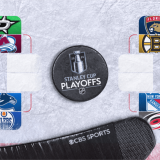We're still at least two months away from meaningful NHL games being played -- the NHL said last week that Phase 3 of its return to play plan wouldn't start before July 10 -- but we do have somewhat of an idea of what things will look like if/when the league finally does return to the ice.
Commissioner Gary Bettman has already declared the regular season over and said that the league will jump right into the postseason when it returns. He has outlined plans for a 24-team playoff, one that will include 16 teams across the two conferences participating in a play-in round.
The matchups for this best-of-five play-in round are already set, so let's take an early look at those matchups and examine how things break down based on what we know at the pause.
Earlier this week, we took a look at the Eastern Conference. Now, it's time to break down the West matchups. We'll take a look at offense, defense, special teams and goaltending before declaring which team holds the advantage in each category and, finally, making a prediction for the series.
No. 5 Oilers vs. No. 12 Blackhawks
Offense: By the numbers, these teams are in similar standing offensively. They're carried by a few offensive pillars up front and have a lot of question marks beyond that. The Oilers rank T-14th in goals per game and 29th in shots per game while the Blackhawks rank 18th and 13th, respectively.
The Oilers have the best player in the world (Connor McDavid) and the Art Ross Trophy winner who'll likely be this season's MVP (Leon Draisaitl) at the top of their lineup, and it's one of the most explosive and threatening duos across the entire league. Unfortunately, the big problem for the Oilers has been putting pieces around them and finding consistent secondary contributors, and far too often Edmonton is carried only as far as McDavid and Draisaitl can drag them. Expect to see A LOT of ice time for those two guys in the postseason.
That being said, they did find some juice later in the year with the insertion of Kailer Yamamoto, and Ryan Nugent-Hopkins was in the midst of a career year before the shutdown cut his campaign short. There's no question that McDavid and Draisaitl will have to carry the majority of the weight for Edmonton offensively, but how far they go may depend on what kind of help they can get from their other forwards.
Chicago still has Patrick Kane and Jonathan Toews leading the charge up front, and those guys will need to be great for the Blackhawks to make any sort of surprising noise as the 23rd seed. Around them, there's a lot of youth, and that youth will have to come up big if the Blackhawks intend to make any unexpected noise as the 23rd seed. Dominik Kubalik has somewhat quietly put together a tremendous rookie season, scoring 30 goals in 68 games. Dylan Strome, Alex DeBrincat Alex Nylander and Kirby Dach are all talented young players who factor into the Blackhawks' top nine but will need to contribute more consistently if the Hawks are to be taken seriously. Advantage: Edmonton
Defense: The Oilers rank 15th in goals allowed per game while the Blackhawks are right behind them ranked 16th. The bigger discrepancy comes in shot suppression, as the Oilers rank 20th in shots allowed per game while the Blackhawks rank dead last among all 31 clubs, allowing over 35 shots per game. The Blackhawks are also second in the league in high danger chances allowed, while the Oilers rank 11th in that category.
There's not a ton separating these two teams defensively, which isn't exactly a compliment. Play in their own end is just not a strong suit or calling card for either of these teams. Costly breakdowns are going to happen in this series, it might just be a matter of which team manages to hold it together a little better. Advantage: Edmonton
Special teams: Edmonton had the best power play in the league this season, and by a good margin. Their 29.5% conversion rate is more than four full percentage points higher than the next-best team (Boston, 25.2%). Meanwhile, Chicago's power play struggled mightily, ranking 28th with a conversion rate of 15.2%. The Oilers also have the edge on the penalty kill, ranking 2nd in the league with an 84.4% kill rate, while Chicago ranks 9th with an 82.1% success rate. Advantage: Edmonton
Goaltending: Chicago's numbers are better in the goaltending department (T-4th in the league with a .913 collective save percentage) but that's a bit misleading considering they traded away their top-performing goalie in Robin Lehner (.918 save percentage in 33 games) at the trade deadline. That's maybe not something they would have done had they known they were going to luck into a playoff spot this year, but luckily Corey Crawford is still a solid option as well.
After struggling with health issues for a lengthy period of time, Crow had a bounce-back campaign in 2019-2020, posting a .917 save percentage over 40 games. He was particularly strong at the tail end of the year, putting up a .929 save percentage over his final 11 games. Can he carry that momentum into the postseason after a long layoff? And will his recent battle with COVID-19 have any effect on his play?
On the other end, the Oilers ranked 14th in the NHL in collective save percentage this year. Mike Smith and Mikko Koskinen split duties in Edmonton, with Koskinen (.917 SV%, 9.25 GSAA in 38 GP) putting up far superior numbers to Smith (.902 SV%, -7.71 GSAA in 39 GP). You'd imagine that'd be enough to earn him the starting job this postseason, but we'll see. Advantage: Chicago
Prediction: Oilers in 4
No. 6 Predators vs. No. 11 Coyotes
Offense: Both of these offensive units can be frustrating despite the fact that they've got a good amount of talent in their forward group. Nashville has had a bit more success by the numbers, scoring 3.07 goals per game (16th in the NHL) to Arizona's 2.71 (23rd). Nashville also had superior shot generation this season, ranking 5th in shots per game while Arizona ranked 14th.
With that in mind, it's important to note that the Predators experienced a bit of offensive regression after John Hynes took over as head coach in early January. Overall, they were a better team, but their offensive numbers took a dip. The Preds have just one forward (Filip Forsberg) with over 20 goals this season.
Meanwhile, the Coyotes have still struggled offensively despite going out of their way to add offensive playmakers like Phil Kessel and Taylor Hall to the front end of their lineup. Nick Schmaltz is Arizona's leading scorer with...45 points in 70 games. The Coyotes also only have one 20-goal scorer this year (Conor Garland). Advantage: Nashville
Defense: Nashville has a leading Norris candidate in Roman Josi on their blue line, plus a pair of other reliable top-end defensemen in Ryan Ellis and Mattias Ekholm. They haven't been the top-tier lockdown team that they were known to be in years past, but they've still been solid defensively, ranking 11th in goals against and 16th in shots against.
The Coyotes have thrived in keeping goals out of their own net and are T-3rd in goals against per game, but they do give up a fair number of chances (23rd in shots allowed) and that's probably not helped by their inability to sustain offensive pressure. Arizona's impressive defensive standing is aided by their strong goaltending, but it's also a very solid group on the blue line. Advantage: Push
Special teams: Both teams have had their issues on the power play this season. Arizona's 19.2% conversion rate ranks 18th in the NHL this year, but their penalty kill has been solid and they rank 5th in the league in PK rate (82.7%). Meanwhile, the Predators' man-advantage has been one of the worst in the league, ranking 25th with a 17.3% success clip, but their PK has been even worse. Nashville is 29th in the league in penalty killing (76.1%). Advantage: Arizona
Goaltending: Arizona's goaltending has been excellent this year and the Coyotes rank 3rd in collective save percentage (.919). Darcy Kuemper has been at the front of the pack (.928 SV%, 16.65 GSAA) and might be a Vezina favorite if he didn't get hurt during the season. You also have to give credit to Antti Raanta and Adin Hill for filling in admirably, and the Coyotes have the luxury of multiple goaltenders they can trust, which is something to keep in mind heading into this postseason.
On the other end, goaltending has been a major issue for the Preds this year, at least with Pekka Rinne in net. Rinne had an awful regular season (.895 SV%, -14.21 GSAA) but Nashville has been bailed out by Juuse Saros, who should be their starter in the postseason. From February until the pause in March, Saros took over the starting role and posted a .940 save percentage in 16 appearances for Nashville. Advantage: Arizona
Prediction: Predators in 5
No. 7 Canucks vs. No. 10 Wild
Offense: Both teams rank in the top half of the league in offense, with the Canucks ranking 8th in goals per game and the Wild checking in at 12th. Both also rank in the bottom half of the league in shots per game, with Vancouver ranking 18th and Minnesota 25th.
The Canucks have a bit more star power offensively with an exciting young core that includes Elias Pettersson, Brock Boeser and Bo Horvat (plus offensively gifted rookie Quinn Hughes on the blue line). They also have veterans J.T Miller, Tyler Toffoli and Tanner Pearson factoring into the top six.
The Wild's scoring load is carried by Kevin Fiala, who had a strong bounce-back year in his first full season in Minnesota, and the work of older vets including Eric Staal, Zach Parise and Mats Zuccarello. Minnesota's not going to win any track meets in this series. Advantage: Vancouver
Defense: By the numbers, Vancouver gives up fewer goals per game (3.10, ranked 20th) than Minnesota (3.14, 24th) but those numbers fail to accurately tell the whole story. There's a strong divide when it comes to shot suppression, as Minnesota ranks 11th in shots allowed per game, while the Canucks struggle to keep opponent's attempts down and rank 28th in the league.
Minnesota has a very good defensive group that includes Ryan Suter, who is a TOI machine, Jared Spurgeon, Jonas Brodin and Matt Dumba. The Wild have allowed the lowest number of high danger chances on net this season, meaning their defensive group does a very good job of staying structured and responsible in their own end -- especially around the net. Advantage: Minnesota
Special teams: The Canucks have one of the most potent power plays in the league, ranking 4th in conversion rate (24.2%). Vancouver is also very effective at drawing penalties to earn those man-advantage opportunities and had the 2nd-most power play opportunities in the league this season. Meanwhile, the Wild rank T-10th with a conversion rate of 21.3%.
Vancouver also has an edge in penalty killing, ranking 16th to Minnesota's 25th. Advantage: Vancouver
Goaltending: The league shutdown may have helped the Canucks in that it allowed Jacob Markstrom to get healthy after a lower-body injury late in the season. Markstrom's emergence as a star between the pipes has been a big reason for Vancouver's success this year, especially given the workload he faces on a nightly basis. Markstrom has a .918 save percentage and 11.40 GSAA (Goals Saved Above Average) in 43 appearances this season, and his ability to hold strong and mitigate the shortcomings of the defense in front of him will be key for the Canucks' chances this postseason.
On the other side, goaltending hasn't been a strong point for the Wild this year. Alex Stalock emerged as the No. 1 option in Minnesota (.910 SV%, 0.84 GSAA) after Devan Dubnyk (.890, -16.23 GSAA) struggled mightily in net. Advantage: Vancouver
Prediction: Canucks in 5
No. 8 Flames vs. No. 9 Jets
Offense: The Flames' offense has been something of a roller coaster this season and they rank 20th in the league in goals per game this season. But they do have firepower on the front end and it's worth pointing out that they were one of the most offensively explosive teams in the league over the final month and a half of the season prior to shutdown. From February to the league pause, no team in the league scored more goals than the Flames at 5-on-5.
But the Jets have plenty of firepower, too. They ranked 17th in goals per game but nobody is questioning the merits of their top six with weapons such as Mark Scheifele, Blake Wheeler, Kyle Connor, Patrik Laine and NIkolaj Ehlers. They're extremely dangerous on the rush and can take advantage of any opportunities given to them. The biggest questions surrounding their lineup are whether they can get strong contributions from the 2C slot and the bottom six. Advantage: Push
Defense: If you simply look at the goals against numbers, Winnipeg looks better. The Jets rank 10th in goals allowed while the Flames are tied for 16th and have given up the most goals in the league via the rush. But Calgary has a talented defensive group highlighted by reigning Norris trophy winner Mark Giordano while the Jets feature a motley crew of blueliners that have been bailed out by spectacular goaltending this season. No team in the league gives up more high danger opportunities than the Jets. Advantage: Calgary
Special teams: Both teams have been middle of the pack on the power play this year (Calgary ranks 12th at 21.2% and Winnipeg ranks 15th at 20.5%) but there's a major separation in penalty killing. The Flames have the 8th most effective PK unit this season (82.1%) while the Jets' porous defense has led to ugly results on the PK, where they rank 22nd with a success rate of 77.6%. Advantage: Calgary
Goaltending: By my accounts, Connor Hellebuyck has been the best goalie in the NHL this season. Playing behind a defense that has opened him up to a firing squad on a near-nightly basis, Hellebuyck has posted a .922 save percentage and 22.40 GSAA in 58 (!) games played. When you boil it down, he's essentially the only reason that the Jets are in the playoff conversation, and he should probably get some Hart Trophy consideration because of that.
On the other side, the Flames are going to need to decide between David Rittich, who got a majority of the work in net this season, or Cam Talbot, who posted significantly better numbers in a more limited role. Talbot's .919 SV% and 7.53 GSAA is far superior to Rittich's marks of .907 and -4.35, respectively. Either way, it doesn't really matter because Calgary is likely going to be outmatched in the goaltending department. Advantage: Winnipeg
Prediction: Jets in 5






















